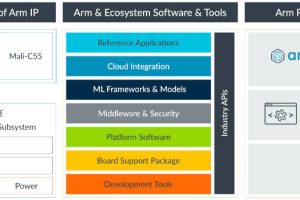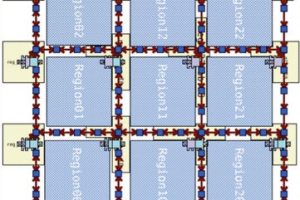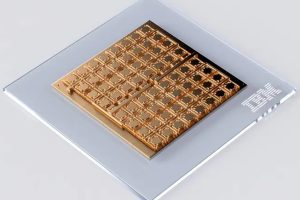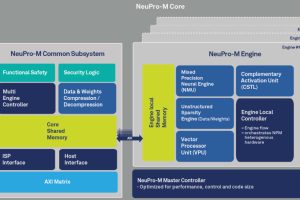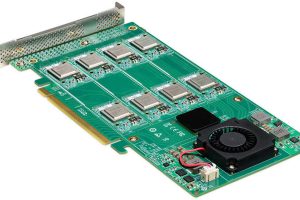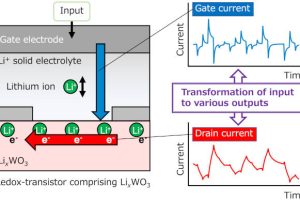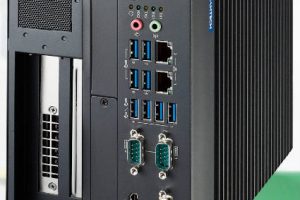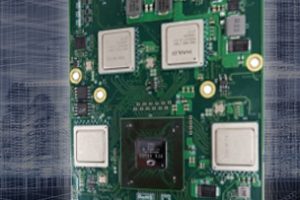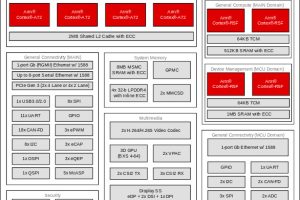Arm has announced its most powerful microcontroller-grade neural processor, which will reach 4Top/s in its maximum configuration and is 20% more power efficient that its previous neural processors. Named Ethos-U85 and configurable with between 128 and 2,048 MACs, it is intended to have enough performance to locally run heavy AI algorithms such as ‘transformers’, as well as convolutional neural networks. ...
Tag Archives: neural network
Fraunhofer IESE partners for AI chip network-on-chip architecture
Faster on-die memory access for AI processing could spring from a collaboration between network-on-chip intellectual property company Arteris and the Fraunhofer Institute for Experimental Software Engineering (Fraunhofer IESE). Memory access is important with neural network algorithms as their execution requires large quantities of data to be transferred between processing elements and memory, increasing emphasis on the performance of the access ...
IBM’s analogue AI chip achieves 400Gop/s/mm2
IBM has revealed an analogue in-memory IC for implementing neural networks. The device stores weights locally as analogue levels as conductance in phase-change memory, and implements analogue multiply-accumulate calculation. For analogue AI processing “two key challenges need to be overcome: These memory arrays need to compute with precision on par with existing digital systems, and they need to be able ...
Ceva adds cores and generative AI to neural processing IP portfolio
Ceva has filled-out its NeuPro-M family of neural processing units, and boosted its architecture for generative AI algorithms. “NeuPro-M NPU architecture and tools have been redesigned to support transformer networks in addition to convolutional neural networks,” according to the company. “This enables applications leveraging the capabilities of generative and classic AI to be developed and run on the NeuPro-M NPU.” ...
Halio adds 208Top/s PCIe processor board, and entry-level AI IC
AI chip maker Hailo has introduced a 208Top/s PCIe processor card for implementing neural networks, and an entry-level version of its Halio-8 IC. The PCIe cards, called ‘Hailo-8 Century’, execute at 400frame/s/W on the ResNet50 benchmark model, said the company, and the highest-performance version can run the same benchmark at 10,000frame/s. Versions start at 52Top/s, and video processing applications are ...
Ionic transistor for meuromorphic computing
Researchers at the Tokyo University of Science have developed an ionic transistor for neuromorphic computing. The ions in question are lithium, its ‘gate oxide’ is a solid lithium-ion-conducting glass-ceramic electrolyte, and its channel is lithium tungsten oxide that changes conductivity as ions are inserted. Physically, it is built around the electrolyte in the form of a 150μm thick ion-conducting glass-ceramic ...
PC with Nvidia L4 GPU for industrial edge AI
Advantech is aiming at industrial AI with a computer that combines a 12th Gen Intel Core (i9, i7, i5 or i3) CPU with Nvidia’s L4 GPU. Two slim doors provide access for the company’s Flex I/O expansion boards Called MIC-770 V3, “this industrial edge solution is boasts 7,424 Cuda cores and 30.3Tflop/s with 24Gbyte GDDR6 GPU memory in a 72W ...
104Top/s edge AI MXM module has four Hailo-8 processors
Impulse Embedded is stocking a 104Top/s MXM embedded graphics accelerator module for AI processing. Called AI-MXM-H84A, it is made by Aetina and gets its computing power from four Hailo-8 processors from the Israeli manufacturer Hailo. MXM (mobile PCI Express module) was originally designed as an industry-standard socket for graphics processors in laptops. This one is a 82 x 105mm MXM ...
Embedded World: AI vision processing for 12 cameras
In a second announcement in one day at Embedded World In Nuremberg, TI revealed Arm Cortex-A72-based microcontrollers for AI and vision processing with up to 12 cameras, for building, industrial and retail automation. AM62A3 and AM62A7 (and their ..-Q1 automotive cousins) support one to two cameras (up to 5Mpixel, streaming up to 4K30frame/s) at less than 2W for doorbell cameras ...
AI: two prongs promote innovation without harm?
Public health researchers in the US are proposing a novel approach to encourage self-regulation within the AI community, with the aim of reducing harmful outcomes without stifling innovation. “Efforts to promote ethical and trustworthy AI must go beyond what is legally mandated as the baseline for acceptable conduct,” said Jennifer Wager of Penn State University. “We can and should strive ...
 Electronics Weekly Electronics Design & Components Tech News
Electronics Weekly Electronics Design & Components Tech News
